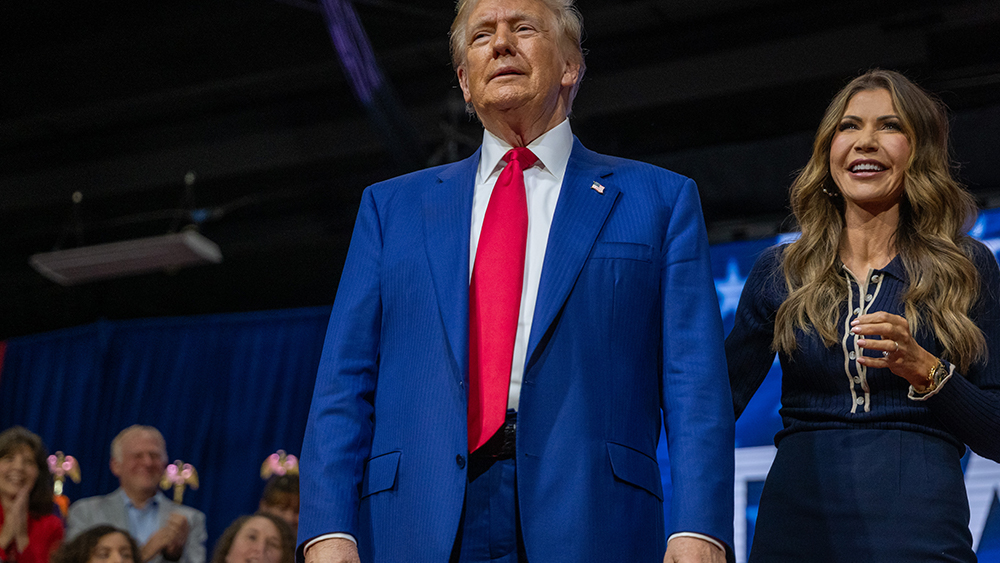 Parler
Parler Gab
Gab
- President Donald Trump escalates trade tensions by combining a pre-existing 20 percent fentanyl-related tariff with a new 125 percent reciprocal duty, totaling 145 percent, targeting a broad range of Chinese goods beyond pharmaceuticals and semiconductors. The measure aims to pressure China on fentanyl trafficking and trade imbalances.
- In retaliation, Beijing imposed equivalent tariffs on over 128 American products, including agricultural goods and machinery, citing the need to protect its interests. Analysts note that the retaliatory rate mirrors prior U.S. sanctions, intensifying a trade dispute dating to 2018.
- U.S. Treasury Secretary Scott Bessent downplays China's response, highlighting a U.S.-favored 5-to-1 trade imbalance and Beijing's unresolved role in supplying fentanyl precursors. He vows further punitive measures if necessary but expresses confidence in diplomatic resolutions.
- Trump announces a 90-day tariff pause for negotiating nations (excluding China), critiquing Beijing’s stance as disrespectful. The exclusion positions the tariffs as a pre-election tough-on-China strategy, aligning with Trump's 2016 campaign messaging.
- Former Fed Chair Janet Yellen and the EU criticize the tariffs as economically harmful, while Chinese officials accuse the U.S. of Cold War-era tactics. The dispute underscores unresolved tensions over trade, public health and trust, with no immediate diplomatic resolution in sight.
China strikes back: Retaliatory tariffs on U.S. goods
Beijing swiftly responded on April 9, announcing tit-for-tat tariffs of 84 percent on over 128 American products, including agricultural goods and machinery. China's Ministry of Commerce stated the move was "a necessary step to protect China's core interests and legitimate rights," though some analysts note the 84 percent rate mirrors U.S. prior tariffs before Trump's announcement on the same day. The Chinese action intensifies a trade war that began under the Trump administration in 2018 and has long strained bilateral relations while reshaping global supply chains. In an interview with Fox Business, U.S. Treasury Secretary Scott Bessent dismissed Beijing's retaliation as a "loser" decision, citing China's 5to5to1 trade imbalance in favor of U.S. imports. "They can raise tariffs, but so what?" Bessent said, arguing the U.S. seeks to strengthen domestic manufacturing and reduce reliance on Chinese exports. He emphasized that China's alleged complicity in fentanyl precursor chemicals – used in opioids flooding U.S. streets – remains unresolved: "The flows into North America and onward to the U.S. demand action." Bessent added that all options, including further tariffs, remain "on the table," but expressed confidence a resolution would emerge at "the highest levels." On April 9, Trump also announced a 90-day pause on new tariffs for countries negotiating trade agreements, slashing their reciprocal rates to 10 percent. But China was explicitly excluded, with the president calling Beijing's stance "a lack of respect to the world's markets." In a Truth Social post, he justified the global pause by noting public anxiety: "People are getting a little bit yippy, a little bit afraid." However, he maintained China's "harsh tariffs" would stay in place until Beijing addresses fentanyl and trade imbalances.Bessent: U.S. will not blink
Economists widely condemned the U.S. tariff hike as counterproductive. Former Federal Reserve Chair Janet Yellen called it "a risky escalation" that risks harming U.S. consumers, while the European Union urged restraint to avoid spillover effects. Meanwhile, Chinese officials accused Washington of perpetuating "Cold War logic," contrasting with efforts to decouple economies. For Trump, the tariffs bolster his tough-on-China stance. Bessent pledged negotiations to "rebalance" trade but emphasized the U.S. will "not blink." China's state media warned of "consequences" but offered no concessions, leaving prospects for dialogue uncertain. For now, families of overdose victims and businesses in both nations await clarity on an escalating conflict. The 145 percent tariff on China marks the sharpest chapter yet in a rivalry reshaping global governance. As markets react and negotiations stall, the fentanyl crisis underscores a broader struggle over power, trade and trust in the 21st-century economy – all set against the high-stakes backdrop of two nations separated by oceans but inseparable in commerce. Watch the video below that talks about Trump doubling down the economic warfare with China. This video is from the Health Ranger Report channel on Brighteon.com.More related stories:
China's counter-tariff strategies: A new chapter in the U.S.-China trade war. Trump's new 50% tariff threat to China rattles markets as allies scramble for deals. Global markets plunge as China retaliates with 34% tariffs on U.S. goods.Sources include:
NTD.com Edition.CNN.com Brighteon.comDeclining imports signal shift in China’s energy strategy
By Belle Carter // Share
Trump administration proposes over $40 billion budget cut for federal health agencies
By Willow Tohi // Share
New York proposes blockchain integration in public payments
By Belle Carter // Share
Trump chooses negotiation table over Israeli airstrikes in key Iran policy decision
By Cassie B. // Share
Governments continue to obscure COVID-19 vaccine data amid rising concerns over excess deaths
By patricklewis // Share
Tech giant Microsoft backs EXTINCTION with its support of carbon capture programs
By ramontomeydw // Share
Germany to resume arms exports to Israel despite repeated ceasefire violations
By isabelle // Share










